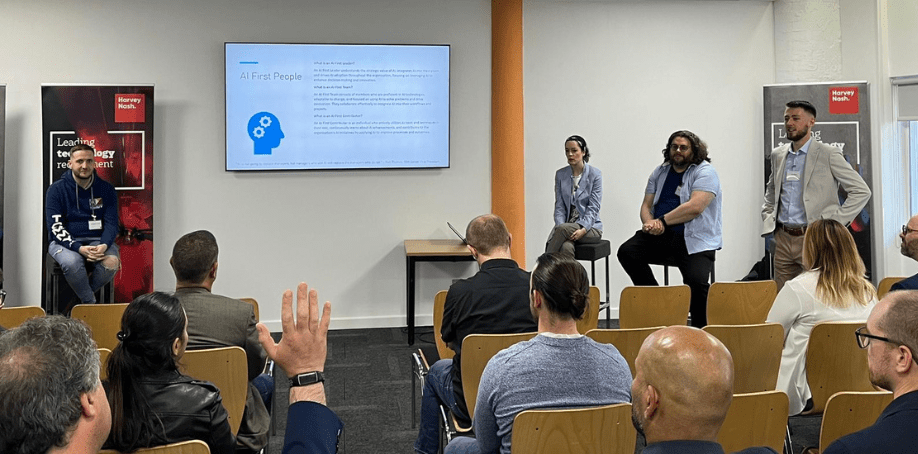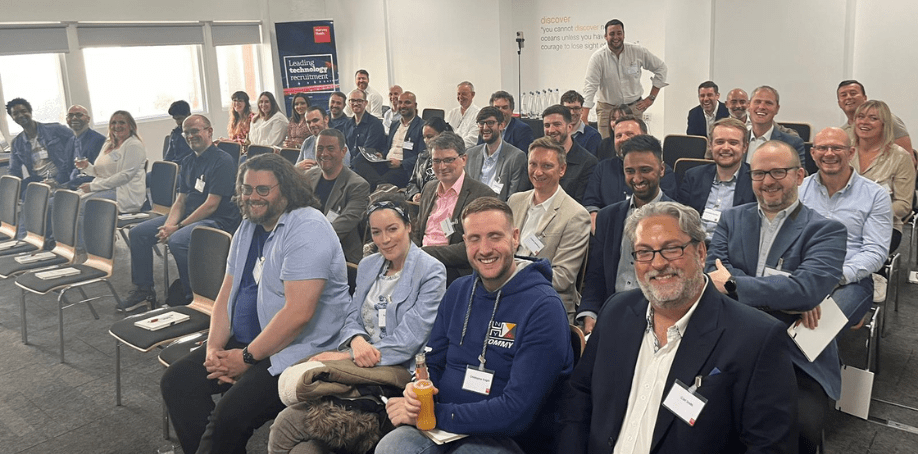Data & BI Leaders Event 2024 – Key Findings
In today’s rapidly evolving Data, Analytics & AI market, organizations face a number of challenges that demand creative solutions. Recently, I hosted a gathering for Data & AI leaders and experts to provide insights into some of the biggest challenges facing our market.
This article highlights our key findings from our presentations, Q&A and high-level discussions and provides actionable insights and recommendations to address.
Preparing for Five Generations in the Workforce by Ryan Parish
As we look ahead to 2030, the workforce will span five generations, each with unique needs and characteristics. Addressing health and wellbeing is paramount to retain talent across this diverse demographic.
The Cost of Ill Health
In 2022/3, the Health and Safety Executive (HSE) estimated the annual cost of short-term ill health and workplace injury at £20.7 billion. Additionally, 35.2 million working days were lost due to ill health, with 1.8 million people suffering from work-related illnesses, primarily stress, depression, anxiety, and musculoskeletal disorders.
The economic impact of mental ill health in England in 2022 was a staggering £300 billion, double the NHS England's budget for that year.
Generational Characteristics
Mental, Physical, Financial, Environmental, and Social Wellbeing
Businesses must enhance their support systems to retain staff and reduce sickness absence. Mental health is a significant concern, with 49% of ill health cases in 2022 due to stress, anxiety, or depression.
Physical wellbeing is also critical, as presenteeism remains a challenge, with 46% of workers admitting to working while unwell.
Financial wellbeing is under pressure, as evidenced by the CIPD 2023 UK Working Lives survey, where only 48% of respondents reported meeting their bills without difficulty.
Moreover, hybrid work environments and robust ESG policies are essential to attract and retain talent, as more than a third of UK workers might quit if forced back to full-time office work, and 52% would stay longer with a company committed to ESG values.
Goodbye Hybrid? The Lifestyle-to-Work Approach
The hybrid model is now the minimum expectation for many employees. The Candidate Experience Report by Greenhouse indicates that 40% of candidates would not apply for a job without their preferred working model, and 77% would consider leaving if flexible work policies were reversed.
Future workforce expectations will include flexibility in work style, supported by comprehensive benefits packages. Employers need to innovate continuously to stay competitive and attract top talent.
Data & BI Leaders: Navigating a Rapidly Growing Sector
The data analytics sector is projected to grow exponentially, reaching $778 billion by 2030. To attract and retain top talent, leaders must offer more than competitive salaries:
Current Offerings: Consider low-cost healthcare options, hybrid working models, and a focus on work produced rather than hours worked.
Next Steps: Add flexibility, develop genuine ESG policies, and review wellbeing benefits.
Future Plans: Prepare for a global talent pool, support digital nomads, and adapt to the 'lifestyle-to-work' approach.
Gen AI Use Case: Product Data Industrialisation by Carl Smith
The use case presented focuses on leveraging Generative AI (GenAI) to optimise product data, improve search engine visibility, and drive sales.
Key Points
SEO (Search Engine Optimisation): Enhancing web content to improve organic search rankings.
SEO Strategies
On-Page SEO: Optimise content quality, keywords, meta tags, URL structure, internal linking, mobile-friendliness, and page performance.
Off-Page SEO: Build high-quality backlinks, leverage social signals, and optimise for local SEO.
Technical SEO: Improve site architecture, mobile optimisation, SSL, speed optimisation, XML sitemaps, and robots.txt.
Product Description Optimisation
Key Takeaways
By adopting these strategies, businesses can enhance product visibility, improve search rankings, and increase sales through effective use of GenAI in SEO optimisation.

Securing Investment for Data & AI Initiatives by Faye Murray
Challenges and Barriers
Securing funding for data and AI projects remains a significant hurdle, with over 70% of executives citing it as a challenge. Many projects fail to move from pilot to production due to funding issues, perceived high costs, and lack of executive sponsorship.
Strategies for Success
Use POCs: Allocate time for innovation and tie POCs to strategic objectives.
Creative Resourcing: Leverage internal and external resources cost-effectively.
Align with Business Objectives: Ensure projects are aligned with strategic & business goals.
Continuous Improvement: Regularly update and iterate strategies.
Internal Champions: Foster a data-literate culture and recruit internal advocates.
Business Case
Analyse the Cause: Determine the root problem.
Assess the Impact: Outline the consequences of inaction.
Propose the Solution: Describe the benefits of the solution.
Preparing for AI: AI-Ready Data and AI-First People by Christopher Knight
To leverage AI effectively, organisations need high-quality, timely, relevant, accurate, and consistent data. AI-ready leaders understand AI's strategic value and drive adoption, while AI-first teams and contributors integrate AI into their workflows and continuously learn and innovate.
By addressing these challenges and focusing on strategic, flexible, and innovative approaches, leaders in the data, analytics, and AI market can navigate the complexities of a multi-generational workforce and rapidly evolving technology landscape.
Key Actions for Becoming AI-Ready
- ● Invest in data management tools and practices to ensure data quality.
- ● Regularly update and clean data to maintain its timeliness and accuracy.
- ● Standardise data formats and integrate data from various sources.
- ● Provide training and development programs to enhance AI skills among employees.
- ● Encourage continuous learning and staying updated with the latest AI trends and technologies.
- ● Develop AI literacy among leadership to foster a supportive environment for AI initiatives.
- ● Promote a culture of innovation and experimentation with AI.
- ● Align AI projects with business goals to demonstrate value and secure investment.
- ● Prioritise AI initiatives that offer clear, measurable benefits.
- ● Foster collaboration between AI specialists and other departments.
- ● Maintain open communication channels to keep stakeholders informed about AI projects and their progress.
AI-Ready Data
Ensuring your data is ready for AI is crucial for successful implementation. The key characteristics of AI-ready data include:
Timeliness: Data must be up-to-date to be relevant for AI applications. Old or outdated data can lead to inaccurate insights and decisions.
Accuracy: The data should be correct and free from errors. Inaccurate data can significantly impact the performance of AI models.
Consistency: Data should be uniform across different sources and systems. This means following standardised formats and ensuring data is harmonised.
Completeness: Data sets should be fully populated with minimal missing values. Incomplete data can lead to biased or incorrect AI model outputs.
Availability: Data should be easily accessible when needed for AI processing. Delays in accessing data can slow down AI initiatives.
Validity: Data values must fall within acceptable ranges and adhere to business rules. This ensures that the data used in AI models is sensible and meaningful.
AI-First People
Building an AI-ready workforce involves cultivating AI-first leaders, teams, and contributors. This human aspect is as important as having the right data.
- ● Understands the strategic value of AI.
- ● Integrates AI into the organisation's vision.
- ● Drives AI adoption across the organisation.
- ● Focuses on leveraging AI to enhance decision-making and innovation.
- ● Comprised of members proficient in AI technologies.
- ● Adaptable to changes and new AI developments.
- ● Collaborates effectively to integrate AI into workflows and projects.
- ● Actively utilises AI tools and techniques in their role.
- ● Continuously learns about AI advancements.
- ● Contributes to the organisation’s AI initiatives by applying AI to improve processes and outcomes.

Summary
In conclusion, navigating the landscape of data, AI, workforce diversity, and digital transformation demands proactive strategies and adaptive approaches.
4 key takeaways
About the author
Josh is a Senior Consultant with over 5 years of experience, based in our Birmingham offices. With a passion for recruitment, Josh has a wealth of knowledge within the technology space, providing clients with leading Data professionals of all levels.
To find out how Harvey Nash can support you with your recruitment needs, please click here.
View all news and insights

Teaser
PostContent Type
Latest NewsPublish date
10/21/2024
Summary
With a new Labour government in place in the UK, Nash Squared CEO, Bev White, looks at the importance of digital skills and how they are nurtured. This article first appeared on computing.com.

Teaser
PostContent Type
Latest NewsPublish date
10/14/2024
Summary
Half of UK tech professionals are considering leaving their present role in the next 12 months. Workloads rise for more than half (54%) of UK tech professionals. Almost a third (31%) are consi

Teaser
PostContent Type
EventsPublish date
10/02/2024
Summary
We were delighted to host digital leaders from across Leeds during this year’s Leeds Digital Festival, as we premiered our last Tech Flix film, “AI & Robotics: A Near Future You’re Not Pre
Related jobs
Salary
£400 - £430 per day + Umbrella (Inside IR35)
Location
City of London, London
Sector
Technology Leadership
Location
City of London
Job Type
Contract
Description
IT Service Delivery Manager - Insurance A Leading Financial Services business are looking to hire an experienced IT Service Delivery Manager; someone ideally acting as a Relationship Manager who faces
Reference
BBBH109724_1729551479
Expiry Date
01/01/0001

Author
Thomas Ullyott
Author
Thomas UllyottSalary
£650 - £800 per day + Umbrella (Inside IR35)
Location
Belfast, County Antrim
Sector
Financial Services
Location
Belfast
Job Type
Contract
Description
Governance/Risk - Project Manager A Leading Financial Services business in Belfast are looking to hire a Project Manager who ideally has experience or knowledge in Regulatory Change, Governance and Ri
Reference
BBBH109812_1729528074
Expiry Date
01/01/0001

Author
Thomas Ullyott
Author
Thomas UllyottSalary
£30505.00 - £36942.00 per annum
Location
Lancaster, Lancashire
Sector
Other
Client
University of Lancaster
Location
Lancashire
Job Type
Permanent
Description
Service Management Officer: Licensing and ContractsISS - Information Systems Services Salary: £30,505 - £36,924 (Grade 6) Closing Date: Tuesday 29th October Interview Date: TBCJob advert - Service Man
Reference
BBBH109593_1729525694
Expiry Date
01/01/0001

Author
Samantha Kearney
Author
Samantha Kearney
